In my first year at the university, I was overwhelmed with the abundance of knowledge at my hands. With every new lecture, I grew my confidence as a psychology expert, ready to share knowledge with everyone willing to listen. That changed soon when I became a sophomore. Strangely enough, the more well-versed I was becoming in the intricacies of the human mind and emotions, the more difficult it was for me to share that knowledge with people from outside the psychology circle.
Back then, this got me thinking: “Why is it so hard for subject matter experts to elucidate concepts they specialize in?”. And now, the same applies to our CRM implementation specialists, who excel in their field but sometimes fall into that knowledge trap, assuming all clients have at least a baseline understanding of the topic. False!
The phrase ‘What is CRM’ returns over 27K searches in the USA monthly, clearly proving that not everyone is fully aware of the purpose and benefits of a Customer Relationship Management system. But this is about to change now. Stay with us as we address some of the most common CRM questions that reappear through conversations with our customers and prospects, and watch your knowledge improve in under 10 minutes!
7 CRM questions we’ll answer in plain English
Customer Relationship Management, or CRM, is a mix of sales and marketing technology, often shrouded in technical jargon and confusing phrases that unnecessarily complicate client partnerships. Whether you're a seasoned professional or just beginning to explore the realms of business terminology, our goal is to break down barriers and make CRM understandable and approachable to everyone.
With that in mind, let’s find out what CRM software is – plain and simple.
Table of Contents
Can my leads get stolen via CRM?
How long does it take to implement a CRM system?
How can CRM benefit a business? (And sales & marketing)
What is a CRM software?
We all have that one friend who holds everyone together. The one that makes plans, organizes outings, hosts meetups, and always ensures everyone has a good time. Without them, you and your gang would only see each other sporadically.
Think of a CRM as such a trusted, selfless friend. Like him or her, it brings sales, marketing, and customer interactions all together. It remembers everyone's likes, dislikes, and quirks, facilitating smooth communication and cooperation and strengthening the bond between your teams and customers, whereas otherwise, they would just hang out occasionally without upholding lasting and meaningful connections.
That’s because CRM software like HubSpot, Salesforce, Pipedrive, or Zoho typically combines contact and lead management features, sales and marketing automation, customer service and support, and reporting and analytics. By tying them closely together, it helps businesses store, organize, and analyze customer data to enhance relationships, streamline processes, and improve productivity.
What is HubSpot CRM?
HubSpot CRM is a one-stop customer relationship management platform that helps businesses monitor leads, prospects, and customers. It offers a range of standout features designed to streamline sales, marketing, and customer service processes.
HubSpot’s robust sales automation lets you build and streamline a sales pipeline to efficiently manage sales leads and deals. With customers’ contact details, past interactions, and purchase history in one place, your sales reps can easily automate repetitive tasks, like setting up automated follow-up emails after a prospect downloads a lead magnet, and shift their focus to nurturing customer relations. Lead tracking and scoring help prioritize leads based on engagement, ensuring sales teams concentrate on the most promising opportunities.
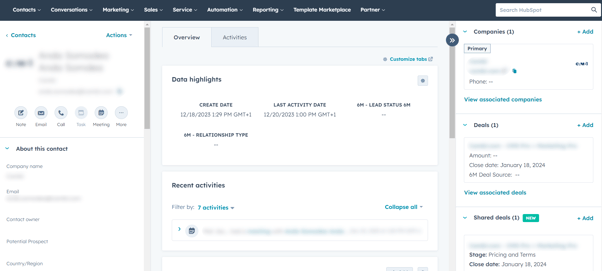
In HubSpot, you can keep track of every contact's information.
The platform integrates with marketing and automation tools effortlessly, creating a comprehensive buyer journey perspective. A customer responding to a marketing email is automatically flagged in the CRM, allowing the sales team to customize their approach accordingly. HubSpot also provides powerful analytics and reporting that generate reports on sales performance, customer engagement, and marketing ROI, offering actionable insights to refine and optimize strategies.
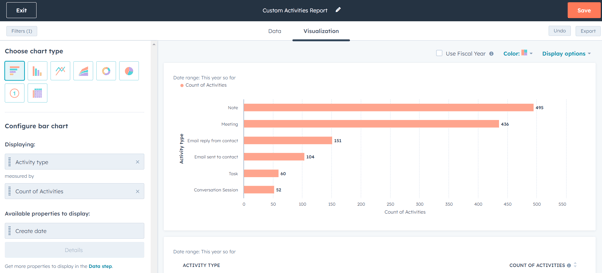
Custom reports allow you to analyze different objects and activities in your HubSpot account.
How much does a CRM cost?
While at first glance, HubSpot pricing may look intimidating for some businesses, the long-term benefits play out in its favor. The initial investment for small businesses can be minimal, especially if you involve a trusted, certified HubSpot partner to conduct the implementation from day one. And as your operations expand, you can seamlessly upgrade to more feature-rich plans.
To shed more light on that, HubSpot's pricing model introduces a unique approach, offering a perpetual free version that provides a foundational database for prospect and customer information, fostering the collection of activities and insights. This free version serves as a hub for storing crucial data. As you explore paid versions of Hubs like HubSpot Sales, the cost aligns with the tool's potential to enhance efficiency significantly.
Moreover, our top choice CRM eliminates the expense of custom third-party services and integrations, saving time and money on buying and installing additional tools. HubSpot provides a comprehensive 360-degree view of user interactions, leveraging data from sales, marketing, and customer support departments.
Boasting impressive ratings of 4.5 on Google Play and 4.7 on the Apple Store, both desktop and mobile HubSpot platforms feature a user-friendly interface, solidifying the company’s position as the preferred choice for sales teams across devices. The customization feature allows companies to tailor the system to their processes without developers’ input, saving time and boosting efficiency.
Going beyond the conventional CRM, HubSpot offers specialized Hubs like Sales and Marketing, each available in Starter, Pro, and Enterprise versions. Users can also opt for the HubSpot CRM Suite, a cost-effective bundle, or choose Free tools to test the features of each Hub. On top of that, when choosing HubSpot, you get a one-stop support team of experts that handles all your inquiries, sparing you the hassle of navigating multiple customer service lines. All that is packed in simple and transparent packages, easily scalable according to your needs:
HubSpot vs. Salesforce vs. Pipedrive vs. Zoho pricing
To help you make the most informed purchase decision, let's break down the annual pricing structures of HubSpot, Salesforce, Pipedrive, and Zoho:
HubSpot pricing
Salesforce pricing
Pipedrive pricing
Zoho pricing
Is CRM difficult to learn?
Now, that’s a tricky one. Namely, 50% of sales leaders find using CRM challenging, leading organizations to overlook valuable tools and potentially lose lucrative deals. Still, is learning CRM truly a formidable task? The truth is that sales and marketing teams often hesitate to adopt it due to concerns about disrupting established workflows. And indeed, the transition to a new system can be daunting, particularly with many features that might seem overwhelming at first glance.
Fortunately, companies can opt for professional partner support to effectively overcome users' resistance. Our team of certified CRM specialists offers personalized guidance to facilitate seamless platform integration. Once all data is prepared for use, we guide our clients through a step-by-step onboarding process to ensure a smooth transition into the new system.
Different CRMs provide users with many resources to help companies unlock the full potential of sales and marketing tools. For example, HubSpot offers an extensive knowledge base with free online courses and certification, community forums, and direct customer support, ensuring readily available assistance. Salesforce adopts a similar user-friendly approach. Their Trailhead platform provides a guided, gamified learning experience, making it easier for users to familiarize themselves with the system.
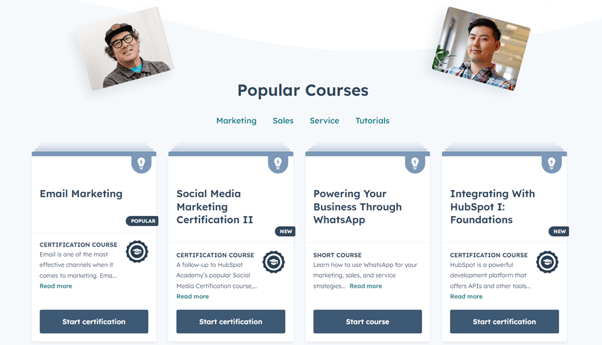
HubSpot offers sales, marketing, and web design and development courses taught by industry experts.
Can my leads get stolen via CRM?
Sales and marketing professionals commonly express concerns about lead theft in centralized CRM systems. This fear often stems from these platforms offering unparalleled data access and transparency, and leads can be passed between teams at different lifecycle stages. However, that transparency is actually a powerful ally in safeguarding leads.
- CRM Traceability. First, every interaction with a lead is meticulously recorded, resulting in a comprehensive timeline that easily traces the journey from prospect to customer.
- Role-based, secure data access. Implementing user roles further strengthens security by defining the access levels granted to each team member within the CRM. This ensures that sales and marketing professionals can collaborate seamlessly while retaining control over their respective leads—allowing, for example, a sales representative to have different access rights than a marketing team member.
- Lead ownership. In addition, many CRM platforms incorporate functionalities for assigning lead ownership, guaranteeing that the individual who initiated the lead retains control throughout the customer journey. Using HubSpot as an example, it facilitates collaborative insights without jeopardizing lead security. This means multiple teams can collaborate seamlessly, gaining visibility into the contributions of each team member throughout the lead's journey. Such transparency actively promotes collaboration, mitigating the risk of lead theft.
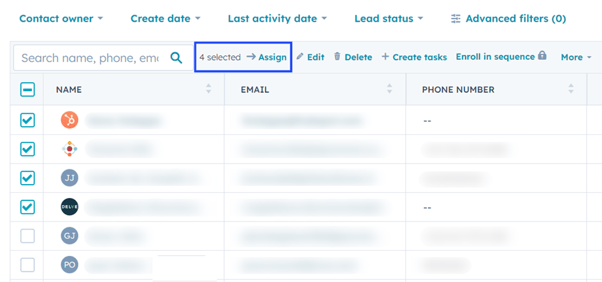
Each lead in HubSpot can have an owner who keeps track of every change in the record.
How long does it take to implement a CRM system?
The time it takes to implement a CRM system can vary widely depending on several factors, including the complexity of the CRM, the size of the organization, customization requirements, and the readiness of the data and team involved. At 6Minded, we meticulously consider all these aspects to guarantee a seamless and successful CRM launch. Below, we estimate each implementation phase's time for a company with 3 sales funnels and about 20 sales representatives on the sales team.
Project planning (1-2 weeks)
We kickstart the CRM implementation with the first call to discuss client requirements, sales and marketing teams’ structure and workflows, and project objectives. This step defines the CRM scope and provides a time estimate for the overall implementation based on organizational needs.
Sales process mapping (2-3 weeks)
Next, we build a streamlined database and define clear sales stages based on the client’s input to pinpoint prospecting and deal stages, data captured on each step, and potential automation.
HubSpot setup (3-6 weeks)
Following that, we create an MVP (Minimum Viable Product) version of the HubSpot setup that gives us an overview of real CRM data. Once the client approves the process, we gather more ideas for the following project phases.
Full team training (1 week)
Now, it's time to step back and let our CRM experts conduct a live demonstration showcasing the configured CRM system. This crucial step includes granting access to team members who will use the CRM. The estimated time for this phase encompasses training sessions, addressing queries or concerns, and ensuring the team is well-acquainted with the CRM's functionalities.
Project launch and hypercare (4-8 weeks)
In this phase, we import the final version of the database. The partnership extends beyond the initial setup, providing continuous support and optimization to maximize the CRM system's long-term benefits.
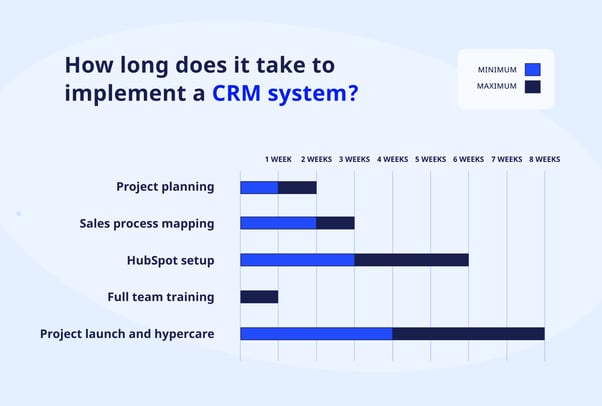
How can CRM benefit a business? (And sales & marketing)
CRM systems offer valuable marketing and sales tools for storing and tracking customer interactions, leveraging personalized data to foster stronger relationships through targeted engagements. HubSpot's implementation of its CRM resulted in a notable 15% increase in customer satisfaction. On the other hand, Zoho shared a case study where targeted email campaigns resulted in a 70% increase in delivery rate.
Streamlining workflows through automation allows sales teams to redirect their focus from mundane tasks toward crucial activities. A notable example is Pipedrive, a CRM platform, which reported a significant 50% reduction in time spent on administrative tasks.
Moreover, CRM platforms are pivotal in providing actionable insights into customer behavior. Salesforce exemplifies this impact by demonstrating a remarkable 27% increase in sales revenue for businesses that embrace analytics-driven decision-making. Access to real-time data empowers sales and marketing teams to make informed and strategic choices.
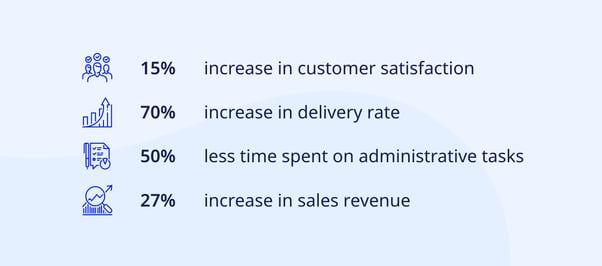
What is a CRM software? – Now you know!
Do you think a CRM system could become your trustworthy business buddy? When in need of a helping hand, give it a try! If you have more questions requiring plain and straightforward answers, send them over, and we’ll address them with you directly and challenge them in another article to keep spreading CRM knowledge. And remember that you can always contact us to discuss your CRM implementation options.

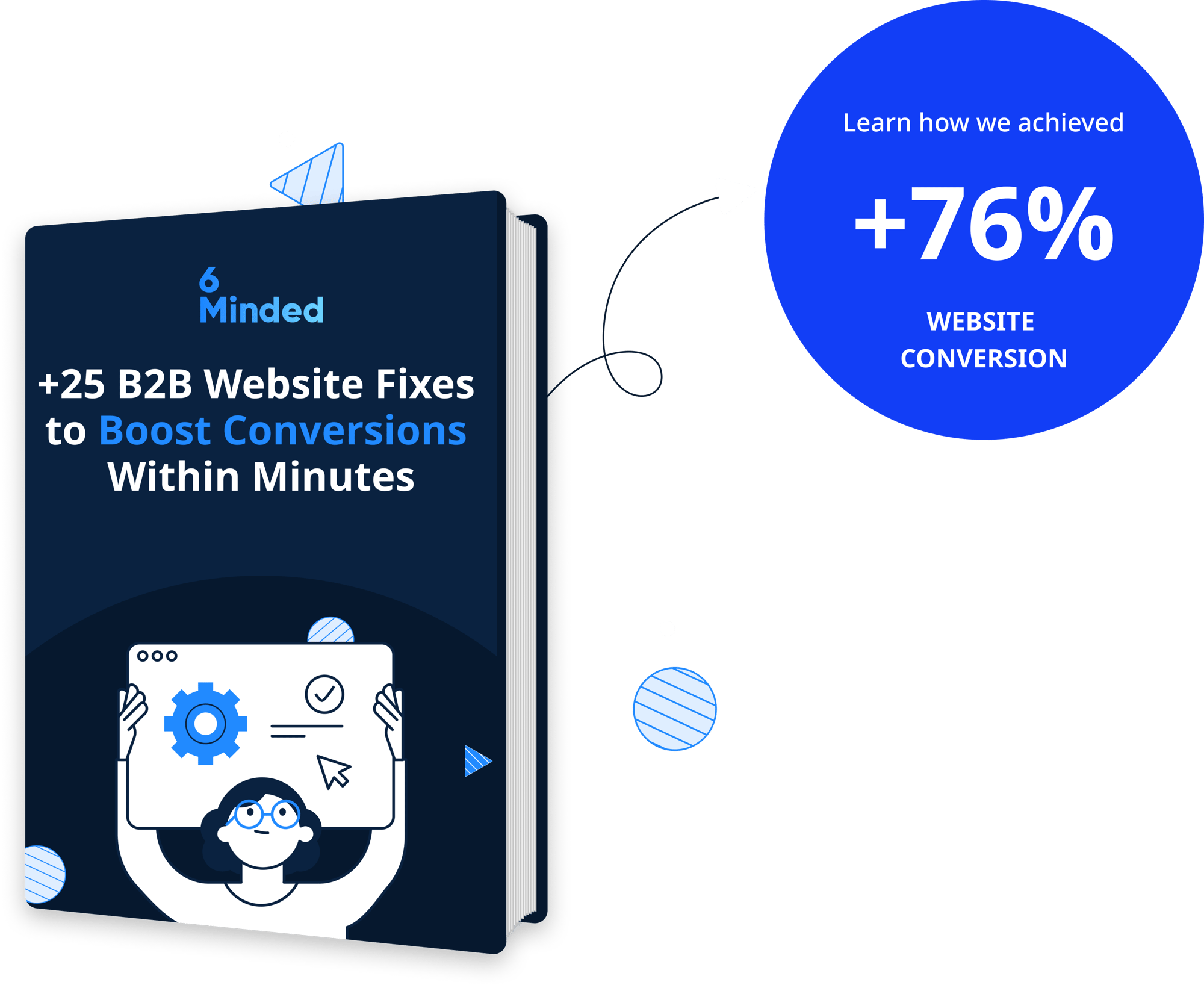
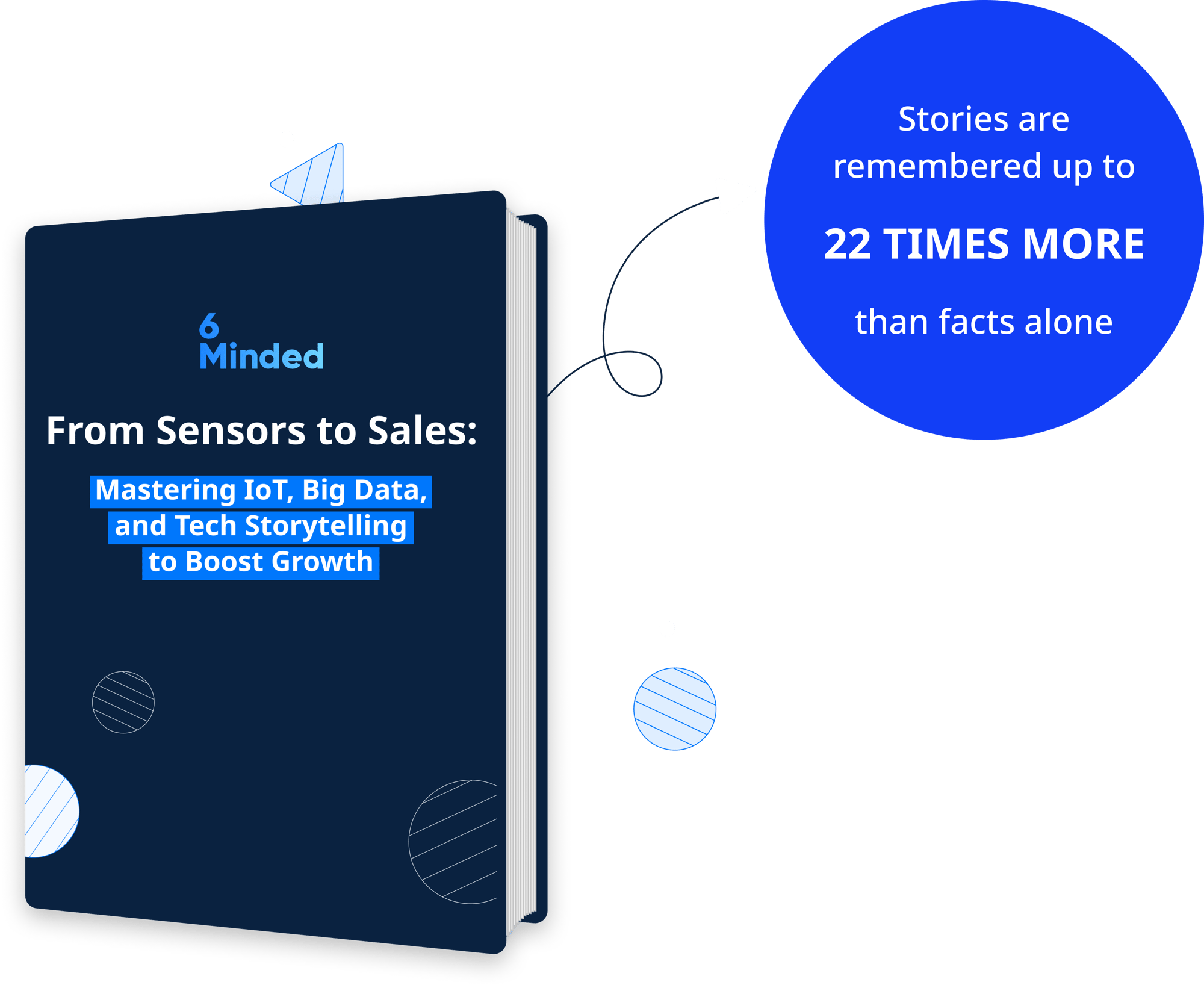
 September 2023
September 2023
